Net migration to UK rises to 260,000 in year to June
- Published
- comments

Net migration to the UK rose to 260,000 in the year to June - an increase of 78,000 on the previous year.
The figure is calculated by taking away the number of people leaving the country from the number coming in.
Prime Minister David Cameron has said he hoped to get net migration below 100,000 before the election in 2015.
But according to the data, 583,000 people immigrated to the UK in the last year - an increase of 45,000 from the EU and 30,000 from outside.
Net migration is now 16,000 higher than it was when the coalition government was formed in 2010.
Labour leader Ed Miliband has accused the prime minister of "spectacularly" breaking the "promise he made to the British people".
BBC assistant political editor Norman Smith said the figures were "deeply, deeply significant" and "deeply awkward for David Cameron".
EU citizens are free to come to the UK and compete for jobs without being subject to any immigration controls.
Those from outside the EU face a much tighter application regime if they wish to enter the country.
Mr Cameron is expected to outline how he plans to reduce European immigration in a major upcoming speech.
It follows a recent admission from Home Secretary Theresa May that it is "unlikely" the government will meet its annual migration target before the election.
'No surprise'
Some 228,000 EU citizens came to the UK in the year to June 2014, the Office for National Statistics said, while the number of people immigrating from outside the EU rose to 272,000.
The figures include 32,000 Romanians and Bulgarians - an increase from 18,000 on the previous year.
Analysis
Dominic Casciani, BBC home affairs correspondent
Today's net migration figure will make grim reading for the prime minister and his pledge to reduce it to tens of thousands by the general election. Many migration experts believe this data is the final nail in the coffin for a pledge that always looked like a tall order.
All the figures are moving in the wrong direction. While the government has no control over EU free movement, policies to cut immigration from the rest of the world have not delivered as great a reduction as ministers had hoped. What's more, these statistics show that non-EU migration is now rising again.
Three quarters of immigration is for work - as the British economy expands so will its attraction to others.
Immigration Minister James Brokenshire said the "disappointing" net migration figures were down to "pressures we've seen from EU migration".
"What I think they show is that where we have the controls, we have seen an impact on non-EU migration - down by around 50,000 under this government to levels that we haven't seen since the late 1990s,
Immigration Minister James Brokenshire said the figures were disappointing
"But where the pressure is being brought to bear is on EU migration where we don't have those same controls... it's absolutely right that the prime minister has identified this as the key pressure point and why he'll be making a speech on those issues very shortly," he said.
Independent experts at Oxford University's Migration Observatory said the government missing its target should "come as no surprise".
Acting director Dr Carlos Vargas-Silva said it would be wrong to suggest the target could have been met without the increased migration from the EU.
"Increased EU net migration has certainly meant that the degree by which the target is missed will be much higher," he said.
"But it is clear that the target would have been missed with or without this increase, as non-EU net migration alone is way over 100,000."
'Dead and buried'
Mr Miliband said his party wanted to reduce the number of low-skilled migrants coming to the country by enforcing the minimum wage, tackling rogue landlords and limiting access to social security.
"We are not going to make promises we can't keep but we do have a plan to deal with people's concerns," he said.
UKIP leader Nigel Farage: "People realise that we have a total open door to nearly half-a-billion people and we have no control"
Liberal Democrat leader and Deputy Prime Minister Nick Clegg said the target had never made sense and had damaged "public confidence" in the immigration system.
"You could have a million people coming into the country and a million Brits leaving and, hey presto, you've met the target," he told LBC Radio.
"This was a Conservative preoccupation. They made that promise. They have now broken that promise and they will have to suffer the embarrassment of having done so."
Speaking to BBC News, UKIP leader Nigel Farage described Mr Cameron's likely missing of his target as a "total failure" of his commitment in 2010.
"It was never really a genuine pledge," he said.
"They were still trying to pretend to the British public that immigration and the European Union were separate questions and now of course people realise that we have a total open door to nearly half a billion people and we have no control."
Sunder Katwala, director of the British Future think tank, said: "There's no point in the government making out that immigration is going in the direction they want it to. The net migration target is dead and buried.
"The question is what happens next, why this has happened and what the government is going to do about it."
Migration Watch UK said the figures were "disappointing" but that a target should remain in place.
Net migration peaked at 320,000 in 2005. It fell to a low of 154,000 in the year ending September 2012.
- Published23 November 2014
- Published13 May 2014
- Published14 April 2011